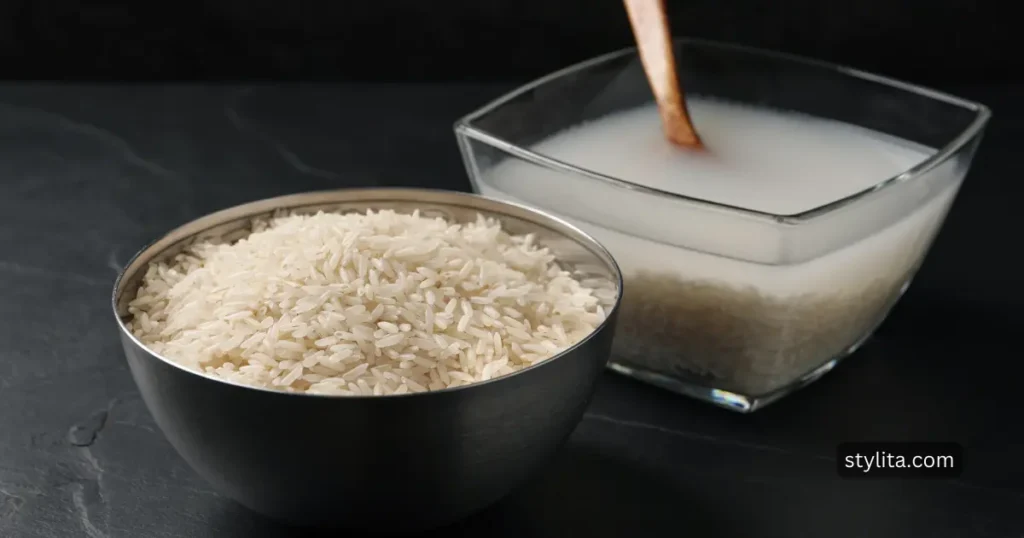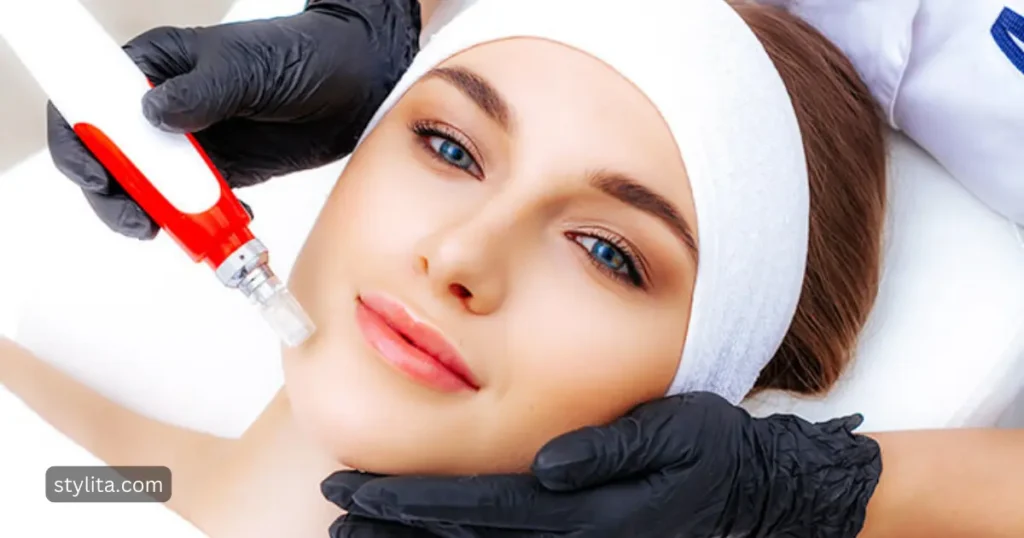In the pursuit of radiant and healthy skin, traditional beauty rituals often unveil hidden treasures. Among these, rice water has emerged as a coveted elixir, transcending cultural boundaries to become a staple in modern skincare routines. Derived from the simple act of rinsing rice, this unassuming liquid is steeped in history, offering promise for a luminous complexion.
Rice water’s journey from ancient beauty traditions to contemporary skincare routines is a testament to its enduring appeal. From the renowned Geisha tradition in Japan, where rice water was used to attain flawless complexions, to the long-haired Yao women in China, who credit rice water for their celebrated locks – this liquid has transcended generations and cultures, becoming a symbol of timeless beauty practices.
Jump To Section
Composition of Rice Water
A. Nutrients in Rice Water
Unlock the nutritional treasure trove found in rice water. Enriched with vitamins such as B1, B2, B3, B6, and E, as well as essential minerals like magnesium and phosphorus, rice water offers a powerhouse of nutrients vital for skin health. The amino acids present contribute to skin repair, making it an ideal candidate for nourishing the skin.
B. Antioxidants and their Potential Benefits
Dive into the world of antioxidants in rice water. Ferulic acid, one of its key components, acts as a potent free radical scavenger, protecting the skin from oxidative stress. Understand how these antioxidants contribute to anti-aging benefits, promoting a resilient and youthful complexion.
Positive Effects of Rice Water on Skin
A. Skin Brightening and Smoothing
Explore the science behind rice water’s ability to brighten the skin. The combination of ferulic acid and vitamins helps inhibit melanin production, reducing hyperpigmentation and promoting an even skin tone. Additionally, the starch content contributes to smoother skin texture, making rice water a holistic solution for skin luminosity.
B. Reduction of Inflammation and Redness
Delve into the anti-inflammatory properties of rice water. Compounds like allantoin and ferulic acid work synergistically to soothe irritated and red skin. Understand how incorporating rice water into your skincare routine can be particularly beneficial for calming conditions like acne, eczema, and rosacea.
Potential Side Effects
A. Allergic Reactions
Rice water is generally considered safe for topical use; however, it’s essential to be aware of potential allergic reactions that some individuals may experience. Allergic reactions can manifest as redness, itching, swelling, or rash on the skin. To mitigate this risk, it is strongly recommended to perform a patch test before incorporating rice water into a regular skincare routine.
Conducting a Patch Test
- Choose a Small Area: Select a small, inconspicuous area on your skin, such as the inner forearm or behind the ear.
- Apply Rice Water: Dab a small amount of diluted rice water onto the chosen area using a cotton pad or ball.
- Observe for 24-48 Hours: Allow the rice water to dry and observe the area for any signs of redness, irritation, or other adverse reactions over the next 24 to 48 hours.
- No Reaction vs. Reaction: If no adverse reactions occur, it indicates that the product is likely safe for use. However, if any signs of irritation appear, it’s crucial to discontinue use immediately.
- Vigilance for Sensitive Skin: Stress the importance of vigilance, especially for individuals with sensitive skin. They should pay close attention to how their skin responds during and after the patch test, adjusting usage based on their skin’s sensitivity level.
B. Irritation and Sensitivity
In addition to potential allergic reactions, some individuals may experience skin irritation or increased sensitivity when using rice water. This can be attributed to the natural compounds present in rice water. To address these concerns, it’s essential to provide practical tips for mitigating potential irritations, ensuring a positive and comfortable experience.
Practical Tips for Irritation and Sensitivity:
- Dilution: Advise readers to dilute rice water with plain water, especially if they have sensitive or easily irritated skin. This helps to reduce the concentration of active compounds, making it gentler on the skin.
- Adjusting Frequency: Suggest adjusting the frequency of rice water use based on individual skin responses. For those experiencing irritation, reducing the frequency can allow the skin to adapt gradually.
- Observe Skin’s Response: Encourage readers to closely observe how their skin responds to rice water. If any signs of irritation persist, it’s advisable to discontinue use or consult with a dermatologist.
- Customization for Different Skin Types: Emphasize the importance of a personalized approach. Different skin types may react differently, and readers should tailor their skincare routine accordingly. Individuals with dry skin may benefit from less frequent use, while those with oily skin may find more regular application beneficial.
C. Risk of Contamination
Proper preparation methods are crucial not only for safety but also to ensure the effectiveness of rice water in skincare. Contamination risks can arise during the preparation process, potentially leading to adverse effects on the skin. Guiding readers through the selection of the right type of rice, soaking techniques, and appropriate storage practices enhances both safety and efficacy.
Minimizing Contamination Risks:
- Selecting the Right Type of Rice: Different types of rice may have varying levels of nutrients and contaminants. Guide readers on choosing high-quality, organic rice to minimize the risk of harmful substances in their rice water.
- Proper Soaking Techniques: Provide detailed instructions on the soaking process, including the duration and water-to-rice ratio. Proper soaking helps extract beneficial nutrients while minimizing the risk of contaminants.
- Appropriate Storage: Emphasize the importance of storing rice water properly. Whether refrigerating or using fresh batches regularly, maintaining hygiene in storage reduces the risk of bacterial or fungal contamination.
- Hygiene During Preparation: Stress the need for clean utensils and hands during the preparation process. Simple practices, such as washing hands before handling rice or using sanitized containers, significantly contribute to safety.
Skin Types and Rice Water Suitability
A. Recommended Skin Types
Tailor recommendations for specific skin types. From oily and acne-prone to dry and sensitive, provide insights into how each skin type can harness the benefits of rice water. Personalize the guidance to help readers navigate their unique skincare needs effectively.
B. Caution for Specific Skin Conditions
Explore cautionary advice for individuals with specific skin conditions. Those with dermatitis or psoriasis, for example, may need to approach rice water usage cautiously. Emphasize the importance of consulting with a dermatologist for personalized guidance in such cases.
Best Practices for Using Rice Water
A. Patch Testing
Expand on the patch testing process, offering an in-depth guide on how readers can effectively perform it. Provide information on observation periods, potential reactions, and interpretation of results. Stress the importance of patience during this crucial step in skincare experimentation.
B. Proper Preparation Methods
Offer an exhaustive guide on proper preparation methods for rice water. Cover various techniques, including soaking, fermentation, and straining. Provide tips on selecting the right type of rice for specific skin benefits, ensuring readers extract the maximum advantages from their rice water.
C. Frequency and Duration of Use
Delve into the nuances of frequency and duration, considering variations in skin type, climate, and individual preferences. Provide a flexible guide that allows readers to customize their rice water routine based on their unique circumstances. Address concerns about overuse and the potential for skin adaptation.
Alternatives to Rice Water
A. Other Natural Skincare Options
Broaden the discussion on natural skincare alternatives, showcasing ingredients such as aloe vera, honey, and green tea. Highlight their benefits, applications, and unique qualities, enabling readers to explore a diverse range of natural options for their skincare routines.
B. Commercial Skincare Products
Introduce readers to reputable commercial skincare products incorporating rice water extracts. Evaluate the efficacy and suitability of these products, considering factors such as formulation, concentration, and additional ingredients. Empower readers to make informed decisions when considering store-bought options.
Conclusion
As our journey into the world of rice water skincare comes to an end, we invite you to revel in the newfound knowledge and embrace the power of radiant skin. In this guide, “Side Effects of Rice Water on Face: Unveiling Best Practices,” we’ve unraveled the secrets, explored potential drawbacks, and empowered you with insights to transform your skincare routine. Remember, skincare is a personal journey, and the allure of rice water lies not just in tradition but in its ability to adapt to the ever-evolving needs of your skin. Let this conclusion mark the beginning of a radiant chapter, where each skincare ritual is a celebration of timeless beauty and the rejuvenating properties of rice water. Here’s to your journey towards a glowing and revitalized complexion – may it be as radiant as the age-old beauty wisdom we’ve uncovered together.



